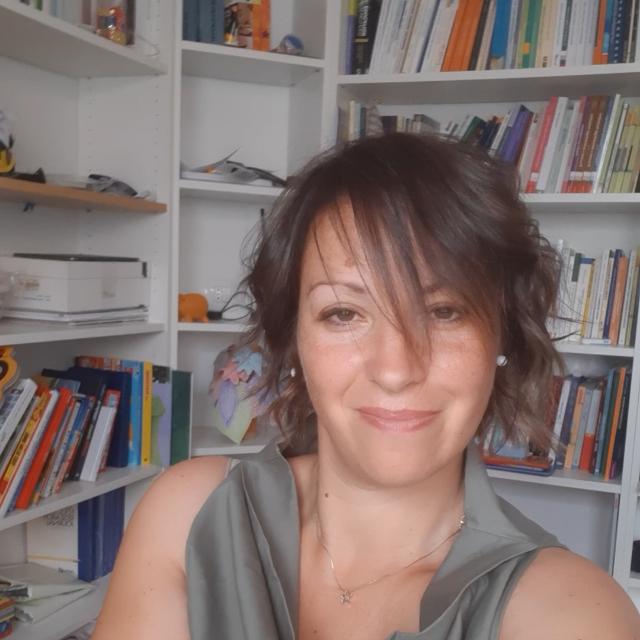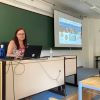Studying at the University of Verona
Here you can find information on the organisational aspects of the Programme, lecture timetables, learning activities and useful contact details for your time at the University, from enrolment to graduation.
Academic calendar
The academic calendar shows the deadlines and scheduled events that are relevant to students, teaching and technical-administrative staff of the University. Public holidays and University closures are also indicated. The academic year normally begins on 1 October each year and ends on 30 September of the following year.
Course calendar
The Academic Calendar sets out the degree programme lecture and exam timetables, as well as the relevant university closure dates..
| Period | From | To |
|---|---|---|
| Sem. 1A | Sep 25, 2023 | Nov 4, 2023 |
| Sem. 1B | Nov 13, 2023 | Dec 22, 2023 |
| Sem. 2A | Feb 19, 2024 | Mar 29, 2024 |
| Sem. 2B | Apr 9, 2024 | May 31, 2024 |
| Session | From | To |
|---|---|---|
| Sessione d'esame invernale | Jan 8, 2024 | Feb 17, 2024 |
| Sessione d'esame estiva | Jun 3, 2024 | Jul 27, 2024 |
| Sessione d'esame autunnale | Aug 26, 2024 | Sep 21, 2024 |
| Session | From | To |
|---|---|---|
| Sessione estiva | Jul 8, 2024 | Jul 13, 2024 |
| Sessione autunnale | Nov 4, 2024 | Nov 9, 2024 |
| Period | From | To |
|---|---|---|
| Festa di Ognissanti | Nov 1, 2023 | Nov 1, 2023 |
| Festa dell'Immacolata | Dec 8, 2023 | Dec 8, 2023 |
| Vacanze di Natale | Dec 23, 2023 | Jan 6, 2024 |
| Vacanze di Pasqua | Mar 30, 2024 | Apr 1, 2024 |
| Festa della Liberazione | Apr 25, 2024 | Apr 25, 2024 |
| Festa del Lavoro | May 1, 2024 | May 1, 2024 |
| Festa del Patrono S. Zeno | May 21, 2024 | May 21, 2024 |
| Festa della Repubblica | Jun 2, 2024 | Jun 2, 2024 |
| Vacanze estive | Aug 12, 2024 | Aug 17, 2024 |
Exam calendar
Exam dates and rounds are managed by the relevant Humanistic Studies Teaching and Student Services Unit.
To view all the exam sessions available, please use the Exam dashboard on ESSE3.
If you forgot your login details or have problems logging in, please contact the relevant IT HelpDesk, or check the login details recovery web page.
Should you have any doubts or questions, please check the Enrollment FAQs
Academic staff
 riccardo.bertolazzi@univr.it
riccardo.bertolazzi@univr.it
 erika.branchini@univr.it; erika.branchini@gmail.com
erika.branchini@univr.it; erika.branchini@gmail.com
 giacomo.mormino@univr.it
giacomo.mormino@univr.it
 alessandra.pantano@univr.it
alessandra.pantano@univr.it
 stefania.pontrandolfo@univr.it
stefania.pontrandolfo@univr.it
Study Plan
The Study Plan includes all modules, teaching and learning activities that each student will need to undertake during their time at the University.
Please select your Study Plan based on your enrollment year.
2° Year It will be activated in the A.Y. 2024/2025
| Modules | Credits | TAF | SSD |
|---|
| Modules | Credits | TAF | SSD |
|---|
| Modules | Credits | TAF | SSD |
|---|
Legend | Type of training activity (TTA)
TAF (Type of Educational Activity) All courses and activities are classified into different types of educational activities, indicated by a letter.
Metaphysics (2023/2024)
Teaching code
4S007340
Credits
6
Language
Italian
Scientific Disciplinary Sector (SSD)
M-FIL/01 - THEORETICAL PHILOSOPHY
Courses Single
Authorized
The teaching is organized as follows:
Metaphysics: [UL] Traditional Lectures
Metaphysics: [UL] Seminars/Workshops
Learning objectives
Metaphysics The course aims to identify the research horizons that characterize metaphysics as the culmination of philosophical inquiry by means of a comparison with an exemplary personality and with a key text in which the question is approached in a theoretically relevant and historically influential way. In such way, the student will be able to acquire the mastery of the metaphysical concepts and lexicon. Secondly, the course aims to provide the critical tools to orient oneself among the different theses, which all often contradict each other, with a special attention to the research perspectives identified by contemporary thought, whose foundations, scope and limits will be discussed. The aim of the course is therefore to provide the students with sufficient critical skills for further study and for the application of their own knowledge to the areas of reference of the current debate, supported by adequate logical-argumentative, hermeneutic, and linguistic skills.
Prerequisites and basic notions
No prerequisites: just basic knowledge of the history of philosophy.
Program
The content of the course of Metaphysics (UL: traditional lectures) is: "Self, world and God according to Leibniz's Discourse of Metaphysics".
The course will follow the internal division of Leibniz’s Discourse of Metaphysics, which is the subject of both the course and the final examination:
1) General introduction to the course, bio-bibliographical introduction to Leibniz and to the philosophical context of the Discourse of Metaphysics;
2) Critical examination of the Discourse of Metaphysics: by means of the traditional lectures held by the teacher;
3) critical examination of the main philosophical positions of the Leibniz's era: in seminar/workshop form by the students (under the guidance of the teacher).
REFERENCE TEXTS
The texts required for the course and the final examination are:
1) Gottfried Wilhelm LEIBNIZ, Discourse of Metaphysics: this text will be available as handout (in full compliance with copyright laws) ONLY on the e-learning platform of the University website: thus, distrust all those copy shops that propose the sale of the above-mentioned handout as “official”.
The reference texts are the same for both attending students and not attending ones.
Additional texts and teaching materials will also be communicated on the e-learning platform of the University website.
Didactic methods
DIDACTIC METHODS
- The teaching methods (for the first part of the course: 24 hours) consist of traditional lectures (face-to-face and online streaming) axed on the reading and the comment on texts of the Discourse of Metaphysics, with the aim of transmitting: 1) the key concepts of theoretical philosophy with regard to the metaphysics; 2) the key concepts of both Leibnitian philosophy and its exegesis; 3) the critical means that are useful for understanding (and for dealing with) the problematic issues involved in Leibniz’s thought.
Each lesson will be recorded and (together with the materials examined during the course) uploaded on the e-learning platform of the University (as mp3 files, or file video via Panopto), with the aim of easing the study for both attending students and those who can not attend lectures, or in the case of the impossibility of face-to-face lessons.
- the second part of the course (for a total of 24 hours) will consist os seminars/workshops (provided face-to-face and streaming online; NOT recorded) carried out by students; under the guidance of the teacher, students (both those who follow the traditional face-to-face lessons and those who attend via streaming Zoom) must deal directly with and analyze the texts of the main philosophers of Leibniz's era concerning "Self, world and God".
The actual way in which this will happen will depend on the number of participating students (in presence and/or via streaming Zoom) and, consequently, will be decided and communicated by the teacher during the first lessons.
REMARK FOR NON-ATTENDING STUDENTS: students who will not be able to attend the lessons (in presence or via streaming Zoom) must replace the second part of the course (that is the sections carried out in a seminar/workshop way) by writing an essay of about 25,000 characters including spaces (font: Times New Roman; font size: 12pt for the body of the text, 10pt for the footnotes; line spacing: 1.5; alignment: justified) concerning a topic chosen together with the teacher. This essay must be submitted (by e-mail to the institutional e-mail address of the teacher) one week before the official examination, in order to allow the the time necessary to formulate a judgment (which will contribute to the final evaluation: see the section "examination methods"). Non-attending students, for writing the essay in replacement of the seminar/workshop part of the course, may possibly require an additional bibliography (depending on their needs/requests / interests, etc.). The teacher will be happy to help them in order to build any additional bibliography.
During the academic year, an individual consultation service is also available (at the teacher's study, by e-mail, or via Zoom) at the times indicated on the web pages (and readily updated), or agreed with the teacher (especially in the case of telematic meetings).
Any suspension of lectures for academic reasons will be readily communicated in the classroom, on the web site, and on the e-learning platform forum.
Learning assessment procedures
The assessment of the learning outcomes of both the key concepts and the issues which concern Leibniz's Discourse of Metaphysics, will be done by means of an oral examination (face-to-face) concerning the programme carried out during the course.
The examination methods are different for attending and non-attending students as regards the following aspects:
• for attending students (in presence and/or via streaming Zoom) the evaluation of their active participation will also contribute to the final evaluation;
• for non-attending students, the teacher, for the final evaluation, will take into consideration his own evaluation of the essay submitted by students (please refer to the "Remark for non-attending students", in the "Teaching methods" section, for typographical standards and submission rules).
Evaluation criteria
The examination consists of questions to test the critical and argumentative abilities of the students, the textual exegesis, the conceptual clarity, and the acquisition of an adequate philosophical vocabulary.
Criteria for the composition of the final grade
The grades are expressed in thirtieths (and in special cases the mention of praise is also granted).
Exam language
Italiano
Type D and Type F activities
SOFT SKILLS
Find out more about the Soft Skills courses for Univr students provided by the University's Teaching and Learning Centre: https://talc.univr.it/it/competenze-trasversali
CONTAMINATION LAB
The Contamination Lab Verona (CLab Verona) is an experiential course with modules on innovation and enterprise culture that offers the opportunity to work in teams with students from all areas to solve challenges set by companies and organisations.
Upon completion of a CLab, students will be entitled to receive 6 CFU (D- or F-type credits).
Find out more: https://www.univr.it/clabverona
PLEASE NOTE: In order to be admitted to any teaching activities, including those of your choice, you must be enrolled in the academic year in which the activities in question are offered. Students who are about to graduate in the December and April sessions are therefore advised NOT to undertake extracurricular activities in the new academic year in which they are not enrolled, as these graduation sessions are valid for students enrolled in the previous academic year. Therefore, students who undertake an activity in an academic year in which they are not enrolled will not be granted CFU credits.
| years | Modules | TAF | Teacher |
|---|---|---|---|
| 1° 2° | Ciclo tematico di conferenze – sulla "leadership femminile": dati, riflessioni ed esperienze | D |
Paola Dal Toso
(Coordinator)
|
| 1° 2° | Ten years of dreams, lapsus, missed acts". Ten years anniversary of 'TIRESIA', Research Centre for Philosophy and Psychoanalysis | D |
Matteo Bonazzi
(Coordinator)
|
| 1° 2° | Invisible plots in contemporary reality | D |
Rosanna Cima
(Coordinator)
|
| 1° 2° | University and DSA - Methods and strategies for tackling study and university studies | D |
Gianluca Solla
(Coordinator)
|
| years | Modules | TAF | Teacher |
|---|---|---|---|
| 1° 2° | Cities and Freedom | D |
Giacomo Mormino
(Coordinator)
|
| 1° 2° | Ten years of dreams, lapsus, missed acts". Ten years anniversary of 'TIRESIA', Research Centre for Philosophy and Psychoanalysis | D |
Matteo Bonazzi
(Coordinator)
|
| 1° 2° | Education and affectivity - 200 years after Christian education by Antonio Rosmini | D |
Fernando Bellelli
(Coordinator)
|
| 1° 2° | Gnoseology and Metaphysics Workshop | D |
Davide Poggi
(Coordinator)
|
| 1° 2° | IV Reading seminar of classical texts | D |
Alessandro Stavru
(Coordinator)
|
| 1° 2° | IV Reading seminar of classical texts | D |
Alessandro Stavru
(Coordinator)
|
| 1° 2° | IV Reading seminar of classical texts | D |
Alessandro Stavru
(Coordinator)
|
| 1° 2° | Nietzsche, tragedy, the tragic | D |
Alessandro Stavru
(Coordinator)
|
| years | Modules | TAF | Teacher |
|---|---|---|---|
| 1° 2° | Cities and Freedom | D |
Giacomo Mormino
(Coordinator)
|
| 1° 2° | Legal clinics | D |
Alessia Maria Aurora Bevilacqua
(Coordinator)
|
| 1° 2° | Ten years of dreams, lapsus, missed acts". Ten years anniversary of 'TIRESIA', Research Centre for Philosophy and Psychoanalysis | D |
Matteo Bonazzi
(Coordinator)
|
| 1° 2° | Gnoseology and Metaphysics Workshop | D |
Davide Poggi
(Coordinator)
|
| 1° 2° | Tai-Ti aiuto io | D |
Alessandra Cordiano
(Coordinator)
|
| 1° 2° | Verso le elezioni europee 2024 | D |
Massimo Prearo
(Coordinator)
|
Career prospects
Module/Programme news
News for students
There you will find information, resources and services useful during your time at the University (Student’s exam record, your study plan on ESSE3, Distance Learning courses, university email account, office forms, administrative procedures, etc.). You can log into MyUnivr with your GIA login details: only in this way will you be able to receive notification of all the notices from your teachers and your secretariat via email and soon also via the Univr app.
Competenze linguistiche
I crediti formativi universitari relativi alle "Ulteriori competenze linguistiche" (B1 informatizzato se seconda lingua; livello B2 completo se stessa lingua della triennale) possono essere acquisiti in una delle due seguenti modalità:
- iscrizione da parte della/o studente presso il Centro Linguistico di Ateneo (CLA ➔ https://cla.univr.it/it/test-e-certificazioni) per il sostenimento e il superamento delle prove + iscrizione, sempre da parte della/o studente, in apposita lista per la registrazione crediti e registrazione CFU (senza presenza) da parte dell’Università.
Oppure
- equipollenza di certificazioni linguistiche esterne: riconoscimento equipollenza di certificazioni linguistiche esterne (➔ https://cla.univr.it/it/servizi/riconoscimento-delle-certificazioni-linguistiche-esterne).
Gestione carriere
Linguistic training CLA
Internships
Graduation
Documents
| Title | Info File |
|---|---|
|
|
pdf, it, 99 KB, 13/10/23 |
|
|
pdf, it, 101 KB, 10/04/24 |
List of theses and work experience proposals
| theses proposals | Research area |
|---|---|
| Linguaggio e mito in Tolkien | ENGLISH LITERATURE - Critical Theory & Poetics |
| Dialettica del negativo in Meister Eckhart | HISTORY OF PHILOSOPHY - MIDDLE AGES |
| La felicità nel Medioevo | HISTORY OF PHILOSOPHY - MIDDLE AGES |
| Le figure di Eva e Maria in Ildegarda di Bingen | HISTORY OF PHILOSOPHY - MIDDLE AGES |
| IA. Una critica fenomenologica al concetto di Intelligenza Artificiale | The Human Mind and Its Complexity: Cognitive science, psychology, linguistics, philosophy of mind - Philosophy of science, epistemology and logic |
Practical information for students
Documents
| Title | Info File |
|---|---|
|
|
pdf, it, 325 KB, 02/05/23 |
|
|
pdf, it, 212 KB, 02/05/23 |
|
|
pdf, it, 131 KB, 02/05/23 |

 +39 045 802 8459
+39 045 802 8459
























